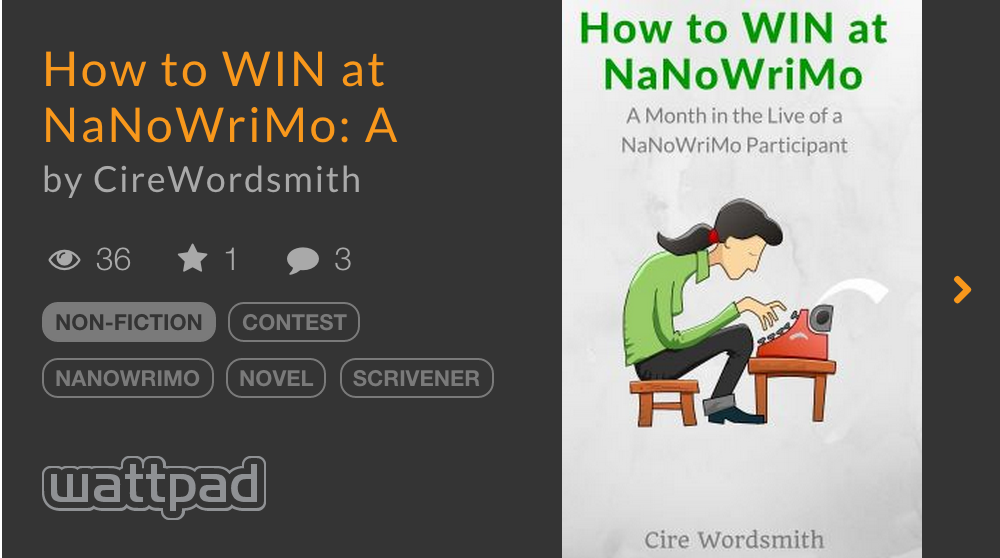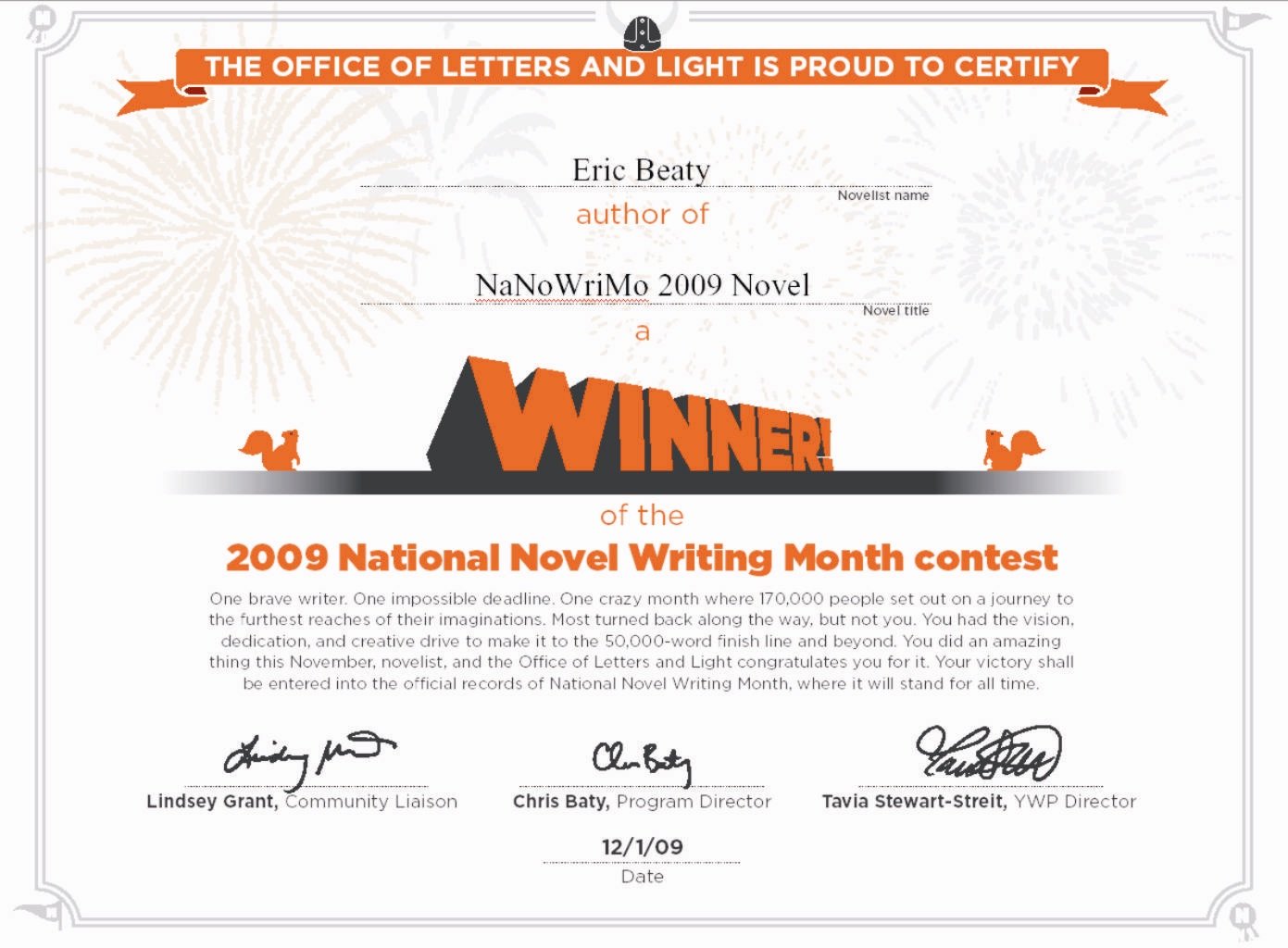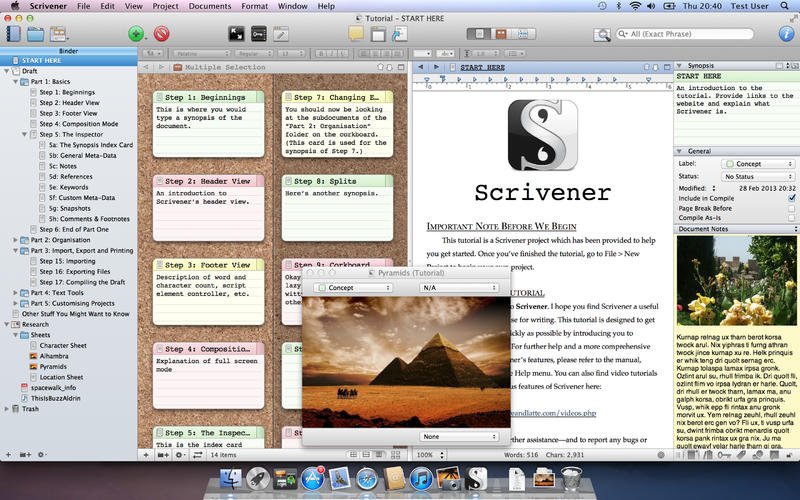Does the term NaNoWriMo mean anything to you? If you’re a writer—especially a young writer—who’s been online for the past 15 years, then it probably does.
![]()

NaNoWriMo…No?
In 2009, I set out to finally achieve my goal of writing a novel. The premise behind National Novel Writing Month, founded in 1999 by Chris Baty, is to write 50,000 words by the end of the designated month, which is always November. Although I won the competition (along with hundreds, if not thousands, of others), my novel was still incomplete, life happened, and I abandoned my novel as a result. Five years later, I began the journey to resurrect and complete it.
Here’s my story.
Update (Dec. 2015): In November 2015 I entered and WON NaNoWriMo! See this article for details.
Update (May 2015): I’ve just re-designed the title and cover as well as created a special BONUS chapter exclusively Wattpad! Click the image below to check out the entire story, and be sure and share with your friends on Wattpad:
 (Taken from a journal entry I wrote after winning the 2009 NaNoWriMo event.)
(Taken from a journal entry I wrote after winning the 2009 NaNoWriMo event.)
My Ultimate Strategy for Winning NaNoWriMo
If you should ever decide to participate in NaNoWriMo at any time, let me suggest you first have at least a small idea of what you want to write about. Because it’s not easy—very difficult, in fact—to come up with something from scratch. Especially when you’re two days late into the game like I was when I started the 2009 NaNoWriMo event.
I knew it wouldn’t be easy; what I didn’t know was how hard it would be to sit down and come up with an idea when you’re already under the pressure of a deadline. The first week was exciting. I was committed to finally participating in (and, ultimately, winning) NaNoWriMo. I had wanted to participate the previous year but had gotten discouraged at the mountain of words I would have to climb to reach the top.
What’s the difference this year? “Stubborn Determination” is my best guess. I was tired of committing to projects and never committing fully to their completion. Tired, also, was I of that heart-wrenching, disappointed feeling I got whenever the last day of November 2008 rolled around and I had yet again been too scared—there, I said it—to even sit down and at least try; if for nothing more than completing one typewritten page.
The First Week
Next to procrastination, I would have to say that excuses are the worst enemy to writers everywhere. One of the first points in Jack Bickham’s 38 Most Common Mistakes Fictions Writers Make is “Don’t Make Excuses.” All they do is rob you of your potential.
So even though the first week is a little intimidating and you keep hearing the voices in your head telling you things like, “Why are you even trying?” or “Are you crazy? You’ll never finish this,” if you want to finish what you started—and when I say “want to” I mean “want to” like you would if you were already successful at it and were getting a pretty penny’s pay for your efforts—then you’ve got to make yourself not make excuses.
Writing is a constant effort; you’re always in danger of discouragement, so you’ve got to dig in your heels and stand your ground. During the first week, you’re not going to give yourself a reason to quit and let your “other you” get in your way and convince you of anything but forward progress.
The Second Week
By the second week—if you’ve stood your ground like a pit bull guards his territory—the writing feels easier, smoother, and you feel like all your sails are up and the wind’s casually carrying you on your merry way.
Don’t fool yourself.
As I sit here writing this, trying to recollect the exact feelings of the second week of my NaNoWriMo experience, I remember that although I had come up with some interesting characters and some ideas of how they would behave, somehow I didn’t let myself get ahead of myself. I didn’t think myself invincible, in other words. There were times when I could have, believe me. I guess it was just intuition; somehow I just knew not to let myself slow down and become complacent.
The Third Week
Enter the third week. And by the way, I’m not counting the near impossibility of writing on weekends! You know, those days where you would rather be doing anything—and I mean anything—but writing. At first, having to sit still and write while everyone else gets to go outside the constraining walls of their homes and play reminds you of your days in elementary school.
You know the ones: you’ve committed some third grade atrocity, and now you’re having to sit inside and write “I will not talk” or something along those lines while everyone else is outside enjoying the beautiful sunny day, climbing on jungle gyms and sliding on slides, or, if in the winter months, while all the other “good” kids get to build snowmen and throw snowballs at each other. You’d be happy just to throw a few at the teacher who put you in this situation in the first place!
Next to procrastination, I would have to say that excuses are the worst enemy to writers everywhere.
Like I said before, though, weekends or not, no excuses! If you’re going to get to the finish line with all your hair —not to mention your story—in tact, then you’ve got to mean business with yourself…even on weekends.
Now, back to the third week of production. Okay, so you’re flying high and feeling pretty good about yourself. By now you’re telling all your friends about your endeavor to become the next great novelist and basking in their praises. I can be generous here and allow you a bit of pride. If you’re working hard, you deserve it.
But only a bit.
Don’t hate me, please. You’ve got to remember, you can’t let yourself get distracted. Enjoy yourself…but only for as long as it takes for you to get to the next writing session, which should be as close as possible to the same time every day. Don’t stop for praise. When all is said and done and the words are on the page, praise won’t win you the prize. The words themselves are praise—and prize—enough.
The Home Stretch
Okay, so you’ve managed to convince yourself it’s worth attempting your first go ‘round at writing a full-length novel (50,000 words in order to win a NaNoWriMo event, to be exact). You’ve survived the deceitful, easygoing trap of the second week. And—bet you never thought of this—the third week has went by faster than the other two combined. Why? Because we’re entering the dreaded, all too soon to arrive, make or break fourth and final week.
This is the week that separates the men from the boys; the determined from the defeated. This is what it’s all been building up to. This is where you may feel tempted to go back and make some “last minute” revisions. “Just a few,” you say. But it’s never “just a few” because it always escalates into “maybe a few more,” followed by “I’ve got plenty of time,” until you finally realize time’s up in only two hours and you’re writing like the wind to try and catch up 10,000 words or so, only to further realize “You blew it! You’ll never make it! You failed NaNoWriMo! It was all for nothing!” (in terms of winning), and so on and so forth, until…
But let’s not get ahead of ourselves. You’ve got one week. This is not the time to start perfecting your prose. That won’t come until you’ve written “The End,” which may not come until a few more weeks, maybe even months. That’ll depend on if your characters are still lively and involved in the story as well as in each other’s lives. Mostly, it’ll depend on if you’re still involved. Just because the month ends doesn’t mean your novel has to end just yet. It’s still your novel, after all, even if it was written because of NaNoWriMo.
Don’t stop for praise. When all is said and done and the words are on the page, praise won’t win you the prize. The words themselves are praise—and prize—enough.
What your main focus should be right now (what mine was, at least) is, first and foremost, not giving up. Oh yes, you’ll want to. You’ll want to give up now more than you ever did in the entire month. “That’s crazy,” you say. “Why would I want to give up on my novel when I’m only one week away from winning?”
Writer’s block, for one. Think about it: more often than not, writer’s block is most prominent at the beginning (when you can’t find anything or any ideas to write about) and near the end (when you realize just how far behind you might be—and probably are—in your word count). Under the pressure of producing, it becomes harder and harder to keep the same confidence in yourself as you had in weeks two and three.
For another, you may run into snags along the way. Plot holes, seemingly impossible odds, and the lack of secondary ideas for subplots and character development…to name a few. You may even burn out. After three solid weeks of mass production, you can see how burnout could be a very possible factor; as a result, you may even want to box up the manuscript for good.
What your main focus should be right now (what mine was, at least) is, first and foremost, not giving up.
Not only this, but one of the main problems I ran into during the fourth week of writing was trying to remember important little details about what had already happened in the previous weeks. You have to constantly remember things like: “Who did what?” and “What was [your character’s] motivation?”; not to mention “Who was that minor character way back in ‘so and so’ chapter?”
I struggled hard with that last point. After all, I wanted to write a coherent novel without any loopholes. But I realized (not too late, thank goodness) that all that structuring stuff can wait until after you’ve gotten it written. Someone once said, “Get it written first, then you can get it right.” That’s your goal; has been all along, in fact. It’s during the fourth week, most especially, that you’ll need to remember this. Thumbtack it to the wall above your computer if you have to. Just get it written!
Your job is not to worry about how far behind you are, how overwhelming the task ahead is, how totally unsalable your current work is. And it’s definitely not listening to the voices that constantly say, “Why bother trying even further?” Your job—from the moment 12:00 a.m. hits on October 31st, when you first set out to write your 50,000 words, until 11:59 p.m. November 30th—is to WRITE! Not to critique, not to revise (how can you revise an unfinished work in the first place?), not to judge, but to write. And you’d be a whole lot better off if you set that firmly in your mind before you finish this NaNoWriMo—and before you start the next one.
You Can Do It!
In conclusion, writing a novel isn’t easy. Writing a novel of 50,000 words or more in one month: almost impossible. But you can do it. The first thought I had when I finished this year’s NaNoWriMo was, “If I can do something this hard and stressful and actually complete it, what’s stopping me from doing other seemingly impossible things and completing them as well?” Take just a moment and re-read that last sentence. Think of the power of that statement.
For me personally, these “seemingly impossible things” included losing weight, finishing other projects I had trouble completing, or, heck, writing another novel, for goodness’ sake. Not only that, but I’m one step—one huge step, let’s not forget that—closer to getting published. I anticipate the revision process will be exciting as well from what all the writing books say.
The work’s not completely finished by any means; there’s still a lot of patience to be learned, but isn’t everything about this a learning process? You didn’t come to the word processor to get paid after all. If you did, you’re going to be sorely disappointed. The wages are in the words. And the wages are always in the words. If you get absolutely nothing else out of this, I hope that previous statement registers and resonates with you throughout your entire writing life and/or career.
So good luck and good writing. I’m glad you decided to join us. Don’t quit, don’t make excuses, and don’t be a perfectionist. Do write, do write, and (oh, did I mention?) DO WRITE! You can do it, cliché as that sounds thanks to all those Adam Sandler movies. All you have to do (courtesy of Nike) is “Just do it.” Nothing more, nothing less.
So go ahead, fellow NaNoWrimite. I did it on my first try. As Jesus would say, “Go and do thou likewise,” (Luke 10:37).

Author’s Note (Originally included in a separate post of this article on my NaNoWriMo profile): What you have just read is now, as of this writing, five years old. I found it while going through some of my old journals. I can’t remember if I posted it online somewhere else when I originally wrote it or not, so it’s making it’s home online now, just shy of one week before NaNoWriMo 2014.
The main reason I’m posting this now is to encourage you to never give up. Why? Because after finishing NaNoWriMo 2009 and writing the necessary 50,000 words to win, I ended up laying the whole project aside. Many things were going on in my life that caused me much trouble and heartache, and I was never able to get the steam back in my sails that would spur me on to complete my novel.
That is until this month, October 2014, when I began again. After much personal success in writing in personal journals, online blogs, articles, etc., as well as studying and researching many of the writing books I retained over the years and various online blogs of popular self-published writers such as Joanna Penn, who has a wealth of information and interviews with other equally inspiring authors in the self-publishing field, I have finally regained the confidence needed to continue on with my original novel and am determined (stubbornly) to see it through to its completion.
Also, after having worked on my Bluegrass Guitar Essentials course for over a year, I’m ready to change directions and have allotted myself the entire year in 2015 to complete my novel. I feel that anything else would be unsatisfactory. In 2006, I attempted to write my very first novel apart from NaNoWriMo but gave up on it because I didn’t really have a direction to take the story. Again, in 2009, I quit my NaNoWriMo novel shortly after the event ended, but, thankfully, I retained all of the files and notes, so I’m determined not to see all my hard work go to waste so easily this time.
Lastly, the discovery of an amazing software I’ve been trying out for the last month, called Scrivener, has been one of the best things I’ve found to aid me in the completion and organization of this and other future works of both fiction and non-fiction alike. It’s very discouraging and daunting to keep track of all those files in an ordinary word processing program like Microsoft Office or OpenOffice; Scrivener takes care of this with it’s own unique filing system.
(Keep in mind, though, that Scrivener has a bit of a learning curve, so if you need help getting started or just want to see how far you can push the envelope, click here to check out the guy who’s quickly become known as “The Scrivener Coach”: Joseph Michael of Learn Scrivener Fast.)
So I encourage each one who reads this to join along with me this year during NaNoWriMo. I won’t be participating in creating a new novel, and therefore won’t be entering the competition, but having an entire month dedicated to writing is one of the best motivators I could ask for. Best of success to everyone out there who attempts—and completes—this amazing journey with me.
Eric Beaty
October 28, 2014
If you’ve found this content to be valuable to you, please share it with others whom you feel it will also benefit by using the share buttons conveniently located below. Also, be sure and add this page to your favorites or bookmarks for future reference. Thank you.
E
Featured Resources
Question: Have you ever abandoned a project that just keeps eating away at you to finish? What steps have you taken to complete your project?
Leave a comment below and tell us all about it.


1 thought on “A Month in the Life of A NaNoWriMo Participant”